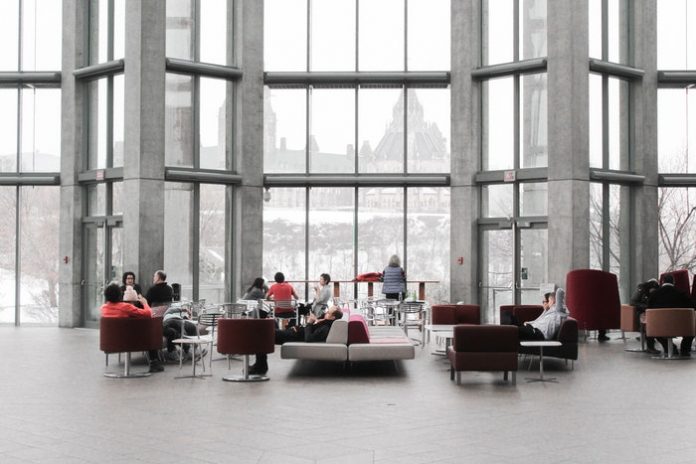From novel writers to budding entrepreneurs, the humble coffee shop has become a haven for professionals in search of a place to work productively. Perhaps with the exception of the library, nowhere else are you likely to find the sheer diversity of workers who have opted to set up shop in well, a shop. But is your local haunt really the best place to do it?
This article takes a closer look at some of the reasons why flexible workers may want to substitute their coffee shop for a more suitable alternative. Here are our seven reasons why you should never work in a coffee shop.
1. How Much Are You Really Getting Done?
We’re leading with the most confrontational question faced by any coffee shop denizen looking to be productive – how much work are you really getting done? Whilst successfully maintaining long-term concentration can be a challenge in any environment, the hustle and bustle found in your local coffee shop is likely to lead to countless distractions.
From the pacing around of waiters and waitresses to the fascinating conversations taking place at the next table, it’s a miracle that you get any work done at all. If some of this sounds familiar to you, it may be time to rethink what kind of working environment would be right for you.
2. You Can Find Flexibility (And Coffee) Elsewhere
Flexibility is one of the key considerations driving the popularity of coffee shops as a work environment. Whether it concerns startups with limited resources or a freelancer looking to work outside of the house, the flexibility offered by the nearby coffee shop offers greater autonomy on how to approach work.
Having said that, flexibility can also be found elsewhere. According to a report by specialist office brokers Office Freedom, the availability of new flexible office space in Central London grew by as much as 42% in 2018. Furthermore, the flexible office market is experiencing a similar upward trend throughout many other parts of the world.
As flexible offices have increasingly become a worthy rival to traditional office spaces, workers are able to enjoy all the benefits of a dedicated office without being subject to any long-term commitments. And did we mention the free coffee?
3. They Lack the Right Facilities
The facilities available in the work environment are essential to getting the job done. Whilst most coffee shops will go some way in covering the basics such as free Wi-Fi, the quality of the facilities on offer can be an obstacle in delivering work efficiently. Unlike offices with a high-speed internet connection, the use of shared (and sometimes unreliable) public Wi-Fi is far from ideal.
Beyond the basics, it’s easy to see why a coffee shop is unlikely to deliver the range of facilities you can expect to find in an office environment. At the end of the day, the café around the corner hasn’t been purposely designed for productive working. On the other hand, coworking spaces, serviced offices and various other types of flexible office are helping to revolutionise workplace facilities as we know them. From on-site gyms and yoga classes to creative breakout spaces, the choices are endless.
4. Security Risks
Whether it concerns internal emails, sensitive client data or anything else, almost every job requires you to deal with some kind of confidential information. Now that the world of communication has gone almost entirely digital, sharing and processing this data securely has become more important than ever before. That sentiment is reflected in the numbers – according to a report by cybersecurity giant Norton, more than 594 million people were directly impacted by cybercrime in 2015 alone.
Offering guests easy access to the internet, public Wi-Fi networks such as those found in coffeeshops are undoubtedly convenient. But given that they can be accessed by anyone, they are also significantly less secure than private ones.
Working online in a coffee shop or any other public place puts your business data at greater risk of being stolen by cybercriminals. For this reason, it’s advisable to restrict your online activities to private networks such as those commonly found in an office environment.
5. Keeping an Eye on Expenses
For most freelancers, startups and SMEs, the cost of renting a dedicated office space is crucial in making the decision to take a more flexible work approach. No matter which type of office you go for, office spaces have always been a key contributor to business overhead.
That said, you may also be unwittingly driving up expenses at your coffee shop – which is the exact opposite of what you’ll be trying to achieve. Possible expenses aren’t just limited to that ‘final’ cup of cappuccino (which could be costing you more than £300 a year) or those infamous over-the-counter gingerbread men. Depending on how productive you are, you may also need to factor in additional costs in the form of lost productivity. In some cases, your total expenses may in fact work out to be higher than what you might have paid if you’d opted for a flexible office instead.
6. Social Limitations
Although the idea of socialising with work colleagues may not appeal to everyone in equal measure, social relationships at work are generally accepted to have a positive impact on job satisfaction and performance. While there’s nothing stopping you from mobilising the entire team to stage a coffee shop takeover, the fact of the matter is that most of the people around you are likely to be complete strangers.
This aspect of coffee shop working can represent a barrier to developing positive and healthy relationships at work. No matter how much the workplace may continue to change in the years and decades to come, strong collaboration and a positive team spirit are forever relevant. With this in mind, the modern office is constantly evolving to leverage these relationships in the best way possible.
7. Coworking Spaces Offer Better Value Than Ever Before
Coworking spaces have played a prominent role in driving the popularity of flexible offices. From their attractive price point to the first-rate facilities offered by them, coworking spaces offer better value than ever before – especially for those who enjoy the flexibility offered by their local coffee shop.
Hot desking – the term used to describe the practice of multiple employees using a single workstation during different time periods – is just one of the ways in which workers can approach their work in a straightforward, flexible and cost-effective way.
According to research by MoneySupermarket, the average price of coworking can be as low as £218 pp/pm in cities such as Nottingham, with other major cities such as Birmingham coming it at an affordable £252 pp/pm. As we mentioned earlier, the price will often also include access to a wide range of high-quality facilities.
Last but not least, turnaround times can be just as impressive. With the number of flexible workspaces steadily on the rise and with the right office broker behind you, you may reasonably expect to find your ideal flexible workspace in a matter of weeks or even days.
The Future of the Coffee Shop HQ
Coffee shops will continue to be a viable option for professionals looking to take a flexible approach to working life, but their popularity is increasingly under pressure from flexible office alternatives. The corner café is unlikely to be displaced as the prime destination for coffee and a biscuit, but its suitability as a flexible work environment is changing at a rapid pace.
Find a Home-Based Business to Start-Up >>> Hundreds of Business Listings.

















































